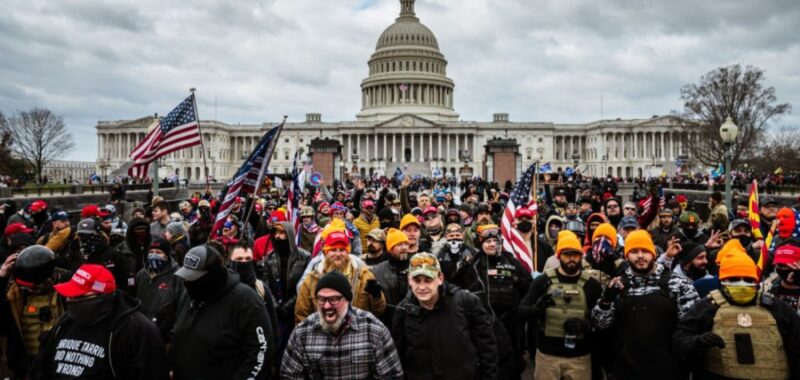
Donald Trump provoked an angry backlash when he suggested that U.S. armed forces could be deployed against “the enemy within” on Election Day. Although such talk of using U.S. troops against political rivals understandably shocked the public, many have worried about the potential for civil unrest on Election Day and its aftermath.
If unrest were sufficiently extreme, the president or state governors might seek to deploy troops to assist law enforcement with regaining order. But would it be legal?
At the Center for Ethics and Rule of Law, we ran a tabletop exercise to explore this question — a question of potentially great relevance in our home state of Pennsylvania. What we learned and set out in our report was instructive, surprising and unsettling.
Particularly after January 6, it isn’t difficult to imagine extreme situations involving civil unrest at polling places — unlikely though they may be — in which National Guard or even regular U.S. Army troops might be called in to regain control. What we found most disturbing, however, were the uncertainties surrounding which authorities might be lawfully invoked to counter such outbreaks of violence at the polls.
Consider one example: Can the president (or the governor) deploy troops to regain order at polling places?
The Posse Comitatus Act forbids use of the military in domestic law enforcement. In this context, an exception — the Insurrection Act — would, in theory, allow a president to use troops in civil law enforcement domestically to suppress a “rebellion or insurrection.” But there is an exception to the exception.
A little-known statute known as Section 592, which Congress passed in 1865 and President Lincoln signed into law, speaks directly to this issue. Section 592 forbids the use of military troops at polls, “unless such force be necessary to repel armed enemies of the United States.”
Would the use of force to curb violent attacks designed to prevent citizens from freely casting ballots at polling places be considered repelling “armed enemies of the United States?”
That question leads to the question whether domestic, violent extremists should be considered “enemies of the United States.” That phrase has typically been reserved for foreign threats to national security. Assuming this approach remains consistent, Section 592 would forbid a president from calling troops to a polling place to suppress domestic violence in an election. The question then arises as to whether that provision supersedes the Insurrection Act, which would arguably apply to opposite effect.
No case law addresses the relationship of these different layers of federal law. If such a case arose, a court might refuse jurisdiction on political-question grounds, but a court accepting jurisdiction would probably find that — as it is both more specific and later in time — Section 592 overrides the applicability of the Insurrection Act.
Would it help if a governor called out the National Guard rather than the president? Probably not. Pennsylvania and some other states have parallel provisions to the federal one, constraining governors just as much as the president regarding calling troops to polling places.
At least concerning civil unrest at the polls, then, fears of heavy-handed military responses that would intimidate voters are unrealistic, as they are prohibited by law. But in a worst-case scenario involving violence at the polls, might military aid to civilian law enforcement be necessary?
While the many calls to revise the Insurrection Act mostly demand narrowing specific overly broad language, here is one instance in which the Insurrection Act actually may not do enough to protect the country from the possible effect of domestic extremism, given the critical importance of free and fair elections to the survival of U.S. democracy. Whether the Insurrection Act makes us more or less safe, of course, depends on who is using it and how it is used.
A final wrinkle further deepened the complexities of our exercise. Suppose that deploying troops to polling places would likely be illegal, but that both the governor and president nevertheless wanted to do so. Could they collude to have the president federalize the National Guard and issue orders, knowing that his or her newfound immunity would be a shield from criminal charges even for issuing a patently illegal order? This is just one of the many complexities that could result from the Supreme Court’s immunity ruling in Trump v. United States. It shows how reverberations from that decision could make the country less safe in myriad ways.
Hopefully none of what we imagined in our tabletop exercises comes to pass, but we must be ready. The clearest lesson was that we are underprepared to address such a scenario — not because federal, state and local authorities have not done their best to prepare for every contingency, but because the legal authorities with which they may act remain contested and unclear.
With the election one week away, it is too late to resolve legal grey areas, but addressing as many of the remaining legal and operational vulnerabilities as possible — with whatever advanced planning and reflection is available — could make the difference between a chaotic transition of power and a peaceful one.
Claire Finkelstein is the Algernon Biddle professor of law and professor of philosophy, as well as faculty director of the Center for Ethics and the Rule of Law, University of Pennsylvania.
Brenner Fissell is professor of law at Villanova University and was the Class of 1964 Fellow at the Stockdale Ethics Center, U.S. Naval Academy.

